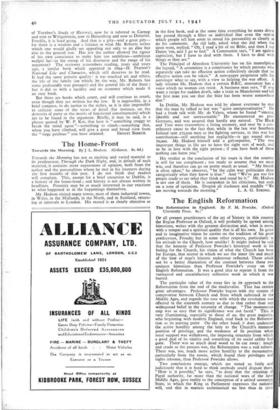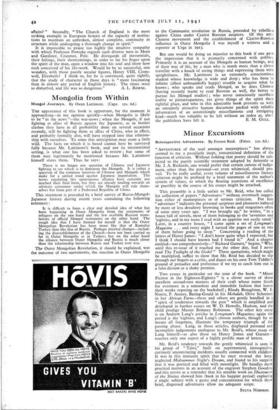The English Reformation
The Reformation in England. By F. M. Powicke. (Oxford University Press. 6s.).
OF all present practitioners of the art of 'history in this country the Regius Professor at Oxford, it will probably be agreed among
historians, writes with the greatest distinction and, what is more,
with a temper and a spiritual quality that is all his own. In grace and in imaginative vision he carries on the tradition of his great
predecessor, Froude; but in some other respects, particularly in his attitude to the Church, how unalilce! It might indeed be said that the keynote of Professor Powicke's historical work is his feeling for the Church, his vision of what the Church has been
for Europe, that mirror in which we see the inner life and much of the best of man's historic endeavour reflected. There could
not be a better illustration of the contrast between these two eminent historians than Professor Powicke's essay on the English Reformation. It was a good idea to reprint it from the variegated and unsatisfactory collective work in which it was buried.
The particular value of the essay lies in its approach to the Reformation from the end of the medievalist. That has certain
great advantages. Professor Powicke begins with the system of compromise between Church and State which subsisted in the Middle Ages, and regards the ease with which the revolution was effected in the sixteenth century as due to that rather than any widespread belief in the necessity of change. "The momentous step was so easy that its significance was not faced." This is very illuminating, especially to those of us, the great majority, who beginning with modern England, read back to the Reforma- tion as its starting point. On the other hand, is does underrate the active hostility among the laity to the Church's immense position of privilege and the weakness of its position when royal support was withdrawn, the imposing structure from which a good deal of its vitality and something of its social utility had gone. There was so much dead wood to be cut away: rough and crude as the process was, the Reformation was a real reform. There was, too, much more active hostility to the monasteries, particularly from the towns, which found their privileges and rights irksome, than Professor Powicke allows.
Two conclusions emerge, which are stated so fairly and judiciously that it is hard to think anybody could dispute them. "How is it possible," he says, "to deny that the rejection of Papal authority, far more than the national wars of the later Middle Ages, gave reality to the conception of a united sovereign State, in which the King in Parliament expresses the national will, and this in matters ecclesiastical no less than in civic affairs?" Secondly, "The Church of England is the most striking example in European history of the capacity of institu- tions to maintain an unbroken, almost complete, continuity in structure while undergoing a thorough change in spirit." It is impossible to praise too highly the intuitive sympathy with which Professor Powicke regards such diverse men as More and Gardiner, Cranmer, Pole. He disregards all inessentials, their failings, their shortcomings, in order to lay his finger upon the spirit of the man, open a window into his soul and show how each conceived of his life-work. Would he be so successful, one wonders, with those purely secular figures, Henry VIII, Crom- well, Elizabeth? I think so, for he is convinced, quite rightly, that the study of character in those days is "more fascinating than in almost any period of English history. The times were so disturbed, and life was so dangerous." A. L. ROWSE.



























 Previous page
Previous page